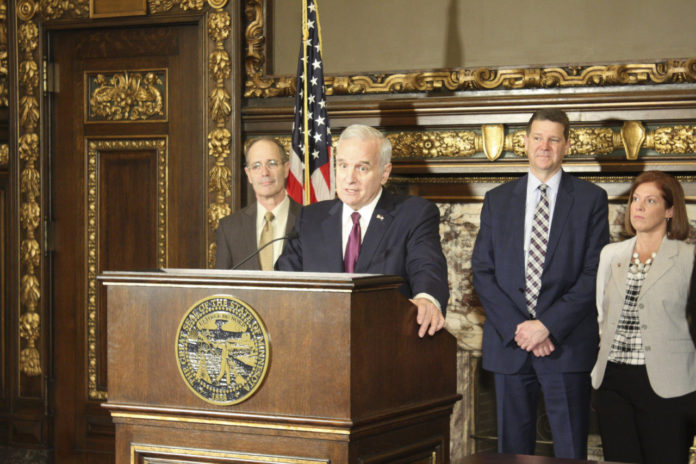MINNEAPOLIS — Gov. Mark Dayton is taking a strong stance against the plan to repeal and replace the Affordable Care Act by Senate Republicans.
On Wednesday afternoon, Dayton is joining DNC Deputy Chair and Minnesota Rep. Keith Ellison at North Point Health & Wellness Center in Minneapolis to talk about the harm removing the Affordable Care Act could cause on Minnesotans.
Ellison has been a strong proponent for universal single-payer health care in the United States.
“I am a steadfast advocate for a single-payer health care system. I am a proud co-sponsor of the United States Health Insurance Act, which will provide health care to all Americans by establishing a national single-payer health care system,” Ellison states as one his constituent issues.
The rise in premiums have left Dayton somewhat critical of how the Affordable Care Act has played out in its eight years of implementation.
Then President-elect Donald Trump even cited Dayton’s displeasure in the Affordable Care Act stating, “The Democratic Governor of Minnesota said ‘The Affordable Care Act (ObamaCare) is no longer affordable!’ – And, it is lousy healthcare.”
The Democrat Governor.of Minnesota said “The Affordable Care Act (ObamaCare) is no longer affordable!” – And, it is lousy healthcare.
— Donald J. Trump (@realDonaldTrump) January 3, 2017
In Minnesota, the rise in health care premiums have been one of the highest in the country. Republicans, Democrats and Dayton teamed up earlier in the year to pass $326.9 million in funding to provide premium relief for more than 125,000 families across Minnesota.
Democrats have been critical of the Republican plans to replace the Affordable Care Act in the House and Senate. The Democratic Congressional Campaign Committee bought ad time in Minnesota targeting Reps. Erik Paulsen and Jason Lewis for their support of the American Health Care Act in April and Sens. Amy Klobuchar and Al Franken have showed their displeasure with both bill rollouts.
The Congressional Budget Office (CBO) states that while the bill would reduce the deficit by $119 billion over a decade, 23 million more people would be without health insurance in the same time period.


















